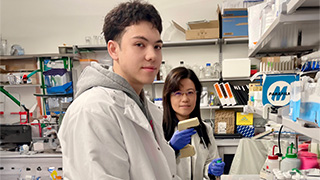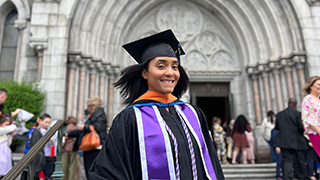Seton Hall Faculty and Biology Student Use Undergraduate STEM Research Award to Study Antibacterial Properties of Green Tea
Friday, April 12, 2024

Professor Chu and James Primerano pictured working in the lab.
With the financial support of a STEM Undergraduate Research award, Seton Hall Biology Professor Tinchun Tina Chu, Ph.D., and James Primerano set out in the Spring semester of 2024 to study how green tea can build up the human body’s tolerance to harmful bacteria found in biofilms. Biofilms are layers of bacteria that develop in the human body and can be difficult to treat with regular antibiotics. Their study, "High Throughput Screening of Novel Epigallocatechin-3-GALLATE (EC16)-Containing Formulations as Broad Spectrum Antibacterial and Antibiofilm Film," explores the antibacterial properties of EC16, a compound found in green tea. The EC16 compound has been patented by Chu and two of her other colleagues in the field, with competitive funding from the National Institute of Health to research whether biofilm-forming bacteria can be treated with this compound.
The plaque that grows on teeth exemplifies how biofilms develop in the human body. Right now, the most common method used in treating biofilm development is mechanical. For example, dentists will typically spray or scrape the plaque away. Chu and James hope to apply the modified green tea polyphenols (EC16) that they have been researching to provide a more natural alternative to treating biofilms. Instead of simply treating the symptom, this compound attacks the bacteria at the source and could be used as a preventative measure. Chu and James hope that this formulation can be the foundation to attack all forms of bacteria.
Currently, many bacteria have developed resistance to antibiotics that already exist and pharmaceutical companies are hesitant to invest in producing new antibiotics, precisely because bacteria will so quickly develop resistance to them. The success of the EC16-containing formulation can help fight against bacteria and biofilm, potentially paving the way for more advancements in antibiotic treatments that are not subject to this resistance. One of Chu’s collaborators, Camellix, LLC., has already produced a "Green Tea Lip Balm" that protects users from contracting the Herpes virus. Chu’s lab is one of several STEM labs at Seton Hall working on the challenges of drug-resistant bacteria and fungi.
While Chu and James are currently following the research timeline, they hope to present their current findings at this year’s Petersheim Symposium. In addition, James will continue their research plan into the summer, prepare a manuscript and present the complete study at next year’s Petersheim. Chu then hopes to present their findings at the 2025 American Society for Microbiology General Meeting (ASM Microbe 2025), which is a globally attended conference held annually in the summer. Overall, Chu and James hope to publish their work so that their research can help the general public.
Though Chu has been teaching at Seton Hall for 16 years, this is the inaugural year that the University has offered a STEM Undergraduate Research Award to support students, even into the summer. Instead of researching at another university, students can remain at Seton Hall during the summer to continue their work. Since the summertime is when students have more time to dedicate to research, this is when most results are generated. Chu and James are grateful that the Office of the Dean of the College of Arts and Sciences was able to offer this award, and they appreciate how such resources make original, hands-on, and impactful scientific research opportunities possible for students, whatever their financial circumstances.
Seton Hall has a robust Department of Biological Sciences with a wide range of faculty researching in microbiology, virology, immunology and other related areas. The Department offers both masters and doctoral degrees, and Seton Hall is excited to announce a new 3+2 B.S./ M.S. Program that will enable students to earn a BS in Biological Sciences and an M.S. in Molecular Bioscience in just five years. Students interested in STEM research should contact Associate Dean Mitra Feizabadi and students interested in STEM graduate programs should contact Associate Dean Michael Dooney.
Categories: Research, Science and Technology






